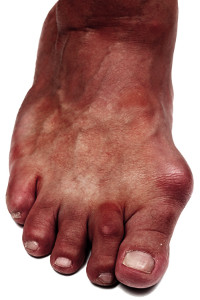
 When there are changes in the muscle structure, the big toe can become angled inwards toward the other toes. The result of this is called a bunion. Although bunions can be hereditary, a developing bunion can become worsened by poor-fitting shoes. Shoes that are either too high or too small can push the feet into awkward positions. If you are looking to avoid bunion development, you should wear shoes with a rounded toe and a wide foot. In the event that you have a severe bunion case, surgery may be required. If you are looking to treat your bunions, speak to your podiatrist for assistance.
When there are changes in the muscle structure, the big toe can become angled inwards toward the other toes. The result of this is called a bunion. Although bunions can be hereditary, a developing bunion can become worsened by poor-fitting shoes. Shoes that are either too high or too small can push the feet into awkward positions. If you are looking to avoid bunion development, you should wear shoes with a rounded toe and a wide foot. In the event that you have a severe bunion case, surgery may be required. If you are looking to treat your bunions, speak to your podiatrist for assistance.
If you are suffering from bunion pain, contact Dr. Sybil J. Fisher of Texas. Our doctor can provide the care you need to keep you pain-free and on your feet.
What Is a Bunion?
Bunions are painful bony bumps that usually develop on the inside of the foot at the joint of the big toe. As the deformity increases over time, it may become painful to walk and wear shoes. Women are more likely to exacerbate existing bunions since they often wear tight, narrow shoes that shift their toes together. Bunion pain can be relieved by wearing wider shoes with enough room for the toes.
Causes
Symptoms
In order to diagnose your bunion, your podiatrist may ask about your medical history, symptoms, and general health. Your doctor might also order an x-ray to take a closer look at your feet. Nonsurgical treatment options include orthotics, padding, icing, changes in footwear, and medication. If nonsurgical treatments don’t alleviate your bunion pain, surgery may be necessary.
If you have any questions, please feel free to contact one of our offices located in Houston and Sugar Land, TX . We offer the newest diagnostic and treatment technologies for all your foot care needs.
Read more about What Are Bunions?Copyright © 2016 S.J. Fisher DPM | Site Map | Design by: Podiatry Content Connection